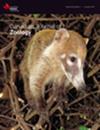Association of reproduction with seasonality in a subtropical viviparous fish, Jenynsia tucumana (Cyprinodontiformes: Anablepidae)
IF 1.1
4区 生物学
Q3 ZOOLOGY
引用次数: 1
Abstract
For fishes in temperate environments, the timing of seasonal reproduction has been correlated with changes in photoperiod and temperature. In tropical environments, seasonal hydrological patterns have been found to be drivers of the onset of reproduction. Despite these established relationships, data on reproductive seasonality for viviparous fish is limited. Here, we investigate aspects of reproduction in the viviparous fish Jenynsia tucumana (Aguilera and Mirande, 2005) over the course of twelve months in the Salí River basin (Tucumán, Argentina), which is characterized by dry, short winters, and long, tropical summers. Size and reproductive data were collected each month. We found J. tucumana displayed marked sexual dimorphism in size, with females having higher length and weight when compared to males. Larger females have higher fecundities compared to smaller females. The breeding season corresponds with seasonal changes in photoperiod, air temperature, and rainfall, but ends with the arrival of heavy rainfall later in the season. Interestingly, J. tucumana produce and mature oocytes year-round, unlike congeneric species. This may be an adaptive strategy imposed by the irregular flooding of subtropical mountainous river stream habitats, which maintain high productivity well into early autumn.亚热带一种胎生鱼的繁殖与季节的关系(鲤形目:鱼科)
对于温带环境中的鱼类来说,季节性繁殖的时间与光周期和温度的变化有关。在热带环境中,季节性水文模式被发现是繁殖开始的驱动因素。尽管有这些既定的关系,但关于胎生鱼类繁殖季节性的数据是有限的。在这里,我们调查了Salí河流域(阿根廷图库曼)的胎生鱼Jenynsia tucumana(Aguilera和Miranda,2005)在12个月内的繁殖情况,该流域以干燥、短暂的冬季和漫长的热带夏季为特征。每个月收集大小和生殖数据。我们发现J.tucumana在体型上表现出显著的两性异形,与雄性相比,雌性具有更高的长度和重量。与体型较小的雌性相比,体型较大的雌性具有更高的繁殖力。繁殖季节与光周期、气温和降雨量的季节变化相对应,但随着季节后期强降雨的到来而结束。有趣的是,与同类物种不同,姜黄全年都会产生并成熟卵母细胞。这可能是亚热带山区河流栖息地的不规则洪水所强加的一种适应性策略,这些栖息地在初秋一直保持着高生产力。
本文章由计算机程序翻译,如有差异,请以英文原文为准。
求助全文
约1分钟内获得全文
求助全文
来源期刊

Canadian Journal of Zoology
生物-动物学
CiteScore
2.40
自引率
0.00%
发文量
82
审稿时长
3 months
期刊介绍:
Published since 1929, the Canadian Journal of Zoology is a monthly journal that reports on primary research contributed by respected international scientists in the broad field of zoology, including behaviour, biochemistry and physiology, developmental biology, ecology, genetics, morphology and ultrastructure, parasitology and pathology, and systematics and evolution. It also invites experts to submit review articles on topics of current interest.
 求助内容:
求助内容: 应助结果提醒方式:
应助结果提醒方式:


